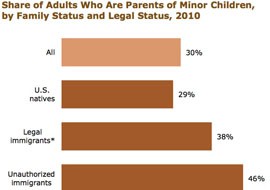Cronkite News has moved to a new home at cronkitenews.azpbs.org. Use this site to search archives from 2011 to May 2015. You can search the new site for current stories.
Report: Tough laws don’t make illegal immigrants ‘self-deport’
WASHINGTON – Strong family ties, the cost of returning to their native countries and fewer economic opportunities back home have kept illegal immigrants in the U.S., despite strict immigration laws here, a new report claims.
The report, released Wednesday by the Center for American Progress, said tough laws like Arizona’s SB 1070 do not prompt illegal immigrants to “self-deport.” Instead, those people either stay where they are, but “in the shadows,” or they move to neighboring cities, counties or states, it said.
“There is really no evidence to show that people go back to Mexico when their states or localities pass anti-immigration laws,” said Leah Muse-Orlinoff, a doctoral student at the University of California-San Diego and the author of the report. “In the most extreme cases, they move to another jurisdiction.”
But Kris Kobach, the Kansas secretary of state who co-authored SB 1070 and a similar law passed last year in Alabama, questioned findings of the report, “Staying Put but Still in the Shadows.”
“It’s a shoddy report because they haven’t considered all the evidence,” Kobach said.
He pointed to lawmakers in the Mexican state of Sonora who expressed concern about illegal immigrants returning home and being jobless after Arizona’s E-Verify law took effect in 2008. That law requires employers to check the immigration status of any prospective employee.
“When Mexican public officials are telling us that illegal aliens are self-deporting, we should take that information and consider it as true,” he said.
Muse-Orlinoff said fewer immigrants are coming in to the country now because of increased border security, coupled with higher costs of crossing and less economic opportunity in the U.S. But those who are already here are staying put because the “mental arithmetic” of leaving doesn’t add up, she said.
She called the policy of “attrition through enforcement” irrational and said that laws like SB 1070, Arizona’s omnibus immigration law, make policing more difficult.
“The biggest detriment by far with these state and local laws is that it creates tremendous distrust and fear between migrant communities and law enforcement,” Muse-Orlinoff said.
Muse-Orlinoff’s report is based primarily on surveys and interviews conducted in Oklahoma City between 2009 and 2010. Oklahoma passed laws cracking down on illegal immigration in 2007 and 2009, before Arizona passed SB 1070 in April 2010.
Lt. Paco Balderrama of the Oklahoma City Police Department said the laws passed in his state made Hispanics afraid to call authorities when violent crimes were committed, because they feared deportation. He said criminals now target the Hispanic community because people there were thought to be less likely to report the crime.
“We’ll never have the numbers of people who didn’t call,” Balderrama said. “It doesn’t benefit anyone for Hispanics to not call the police . . . the fact is those crimes are going to spread.”
Kobach agreed with at least part of the report, that illegal immigrants do sometimes relocate to states with lesser immigration laws, and suggested that some in Arizona may have moved to California.
But he said there are no numbers suggesting immigrants do not also return to their home countries, especially in a border state like Arizona.
“An illegal alien in Oklahoma can self-deport to Kansas . . . which is currently very hospitable to illegal aliens,” said Kobach. “It’s a different dynamic in each state, so it’s really hard to extrapolate.”







